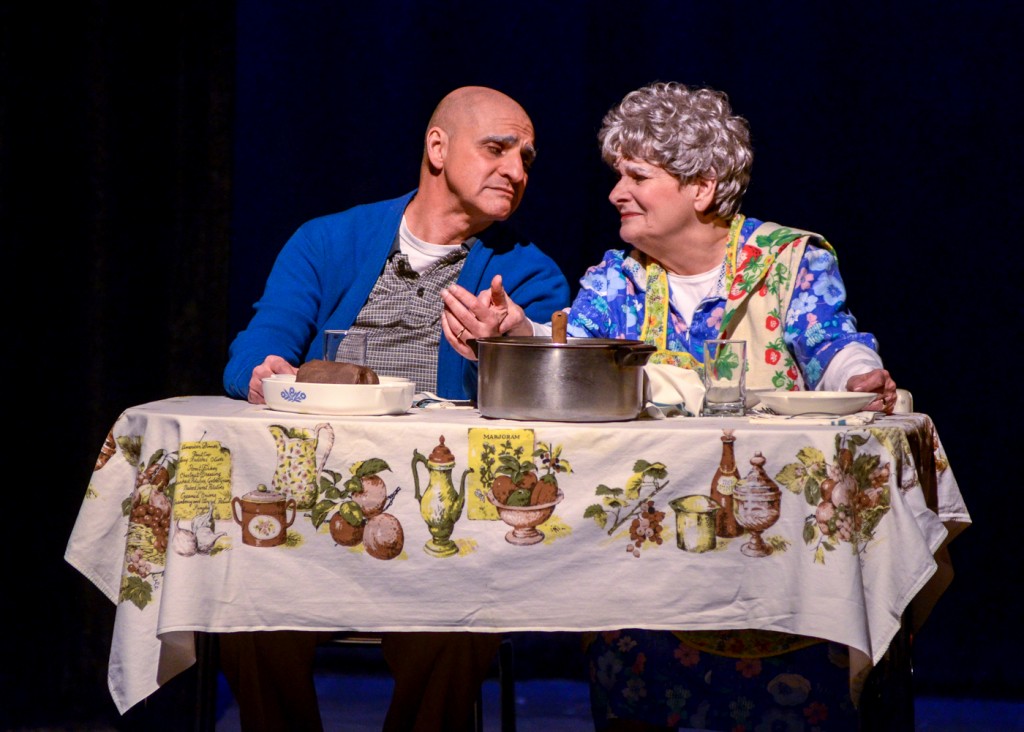 The Community Players continue their 97th season with the wry comedy Lovers and Other Strangers, a compilation of five comic scenes featuring New York couples in various stages of their relationships — from the first bloom of romance to a bedroom battle of the sexes to a long-married couple desperately trying to understand their son’s impending divorce.
The Community Players continue their 97th season with the wry comedy Lovers and Other Strangers, a compilation of five comic scenes featuring New York couples in various stages of their relationships — from the first bloom of romance to a bedroom battle of the sexes to a long-married couple desperately trying to understand their son’s impending divorce.
Written by actors Joseph Bologna (My Favorite Year, Blame it on Rio) and Renee Taylor (The Nanny) the couple starred in the original 1968 Broadway production and earned an Oscar nomination for the film adaptation of the play. The couple’s marriage and Jewish-Italian families were the basis of for this and the more than 20 scripts that they penned together over the years. Taylor often joked that the secret to their successful marriage was “fidelity and pasta.”
Director Christopher Margadonna helms the first two vignettes of the evening, filling them with high energy and sly sight-gags. “Brenda and Jerry” introduces a lanky single guy on the make (David Schillinger) who brings go-go booted beauty Brenda (Ashley Moore) back to his apartment for an attempted seduction that goes very much off the rails. The animated Schillinger is very funny in his desperate attempts to bed Brenda – from rearranging furniture to posing seductively on his faux bearskin rug. Jerry’s lust is matched by Brenda’s glib resistance and her desire to discuss her passion for philosophers rather than sleep with him.
Next up comes our fear of commitment in the form “Mike and Susan,” in which a frantic groom (Kevin Thibault) has gotten cold feet days before his wedding, and has come armed with all the reasons why he needs to break things off with fiancée Susan (Susan L. Perreault). Mike’s increasingly impassioned stream-of-thought monologue is met with quiet and perhaps saintly sanity as Susan takes it all in casually.
The next two scenes, directed by Dan Fisher, deal with more volatile battles, such as monogamy, sexuality and gender roles in a marriage. In a sequence written for the film version, “Hal and Cathy” is set at a party, where tearful Cathy (a poised and peach-clad Rebecca Tung) has locked herself in the bathroom and demands that her longtime lover Hal (a put-upon Richard Griffin) finally leave his wife. While I doubt that there is any director who can truly elevate any scene set in a toilet, when I saw the production in previews, the actors suffered from an inescapable porcelain scene stealer.
“Johnny and Wilma” takes the battle of the sexes and lets it spill over into the bedroom. Wilma (a lithe and forceful Leslie Racine Vazquez) takes the initiative and initiates lovemaking by just climbing on top of her husband Johnny (a gruff and properly disheveled Geoff White) and demanding that he make love to her. White does well in the cliché machismo role as his reaction soon grows from irritation to anger and defensive bullying, then eventually revealing something much more vulnerable.
The longest vignette, “Bea, Frank, Richie and Joan,” make up the second act of the evening. Director Tony Annicone takes the helm as an old-school Italian couple tries to understand why their young son’s marriage is heading toward divorce. It is this section of the show that for me was both the most – and the least – successful. Set in the family kitchen over many bowls of minestrone, Richie (a petulant Ron Martin) is trying to explain to his parents why he and wife, Joan (delivered with a light touch by Emily Van Pelt), are divorcing. Bea (a stellar Sandi Nicastro) has the stereotypical Italian matriarch down pat, from vocal inflection to little details like the sagging hose paired with the dishtowel over one shoulder. Ed Carusi’s Frank is perfectly matched to Nicastro’s Bea, doggedly determined to get to the bottom of the situation by repeatedly nudging his son with, “So, what’s the story, Richie?” Carusi and Nicastro do much with the roles, and you truly feel that Frank and Bea have been together for 30 years. Bonding over food and family they are committed to each other for the long haul. In response to her son’s explanation that he is just not happy in his marriage, the parents are unified in their disbelief. Bea scolds him, “Don’t look for happiness, Richie. It will only make you miserable.”
While the Bologna/Taylor pedigree of humor is on full display in Lovers and Other Strangers, that same humor is so “of an era” that it often falls flat to a modern ear. When Bea describes Frank’s rough treatment on their wedding night, the script lightheartedly (and repeatedly) tosses out the word “rape” as a punchline. As an audience member, I found it hard to keep up the laughter in the darker sections even though I knew at heart the script was intended to be light.
Kudos to costume coordinator Laurea Osborne for dressing the show with such a wonderful array of pitch-perfect fashions. The colorful period silhouettes paired with the show’s music choices firmly support the play’s vintage vibe.
The Community Players continue Lovers and Other Strangers through January 21, with performances Fridays and Saturdays at 7:30pm, and Sundays at 2pm at Jenks Auditorium, 350 Division St., Pawtucket (across from McCoy Stadium). Purchase online at thecommunityplayers.net or reserve at 401-726-6860.